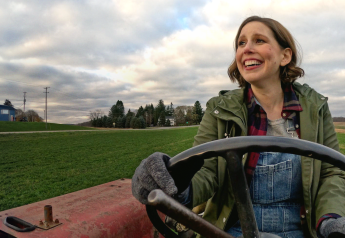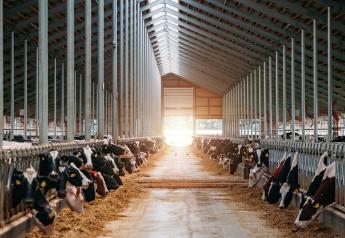Milked Dry in Montana

Brad Kamerman's dairy farm sits along a dusty and rolling road in western Gallatin County, his black-and-white Holstein cows visible to the occasional passerby. Milking there starts daily at 3 a.m. as cows file into pens where rubber tubes simultaneously do the work of a several farmhands, pumping the milk into refrigerated vats.
By the time most county residents are pouring 2 percent over their Cheerios or dropping a dollop of cream into their first cup of coffee, most of Kamerman's herd of 300 will have been milked and the farm will have 20,000 pounds of milk ready for the daily shipment to the bottling plant in Bozeman.
It's a seven-day-a-week job for Kamerman, who bought his first herd of dairy cows in 1978 and can count on one hand the days off he gets in any given year, and he doesn't begrudge it.
"I love this lifestyle," he said while walking around his pens, clad in denim and a full-brim hat, "and I have a wife who puts up with it."
Since the dairy cooperative that would become Country Classic formed in Gallatin County in 1933, dairy farms like Kamerman's have been an important part of the local economy. With the opening of the co-op's processing plant in 1957, Bozeman became a major hub of milk production that would eventually stock milk aisles across the West.
In recent years, the processing plant on North Seventh Avenue expanded as it began processing and bottling Kirkland's Signature milk for two dozen Costco stores in the region --including stores in Montana, Salt Lake City, and Denver. It was a major coup in an industry where billiondollar corporations fight for coveted shelf space.
But in recent years, a combination of hard choices, brutal economics and white-collar crime has hampered the Gallatin Valley milk industry.
Following a major embezzlement scandal that landed three executives in federal prison, Country Classic merged with Darigold, a large co-op based in Seattle. Two weeks ago, Darigold announced that 40 people would be laid off from the Bozeman bottling plant -- two-thirds of the plant's workforce. The same day, company officials said Country Classic's shipping operation -- responsible for delivering milk from Bozeman to grocery stores across the West -- would be completely shut down.
Now, dairymen like Kamerman say better days lie ahead for the local milk industry, one of the final, vibrant milk producing regions in Montana. But a dissenting few see more trouble ahead.
BUSINESS IN A BOX
Like other food industries, the milk market has seen a few huge firms dominate more and more shelf space in grocery stores across the country.
According to the United States Department of Agriculture, the top 10 processors of milk now provide the U.S. with 82 percent of its milk. In 2000, the 10 biggest processors only accounted for 65 percent.
More to the point, in 2009, there was a one-in-three chance that the milk you were dunking your Oreo into was processed by a single company, Dean Foods. Among other things, Dean Foods, a Dallas-based company, owns the Meadow Gold bottling plants in Great Falls and Billings.
In this industry, the relatively small Country Classic was an exception, not a rule. But in recent years, economics began catching up to the company.
For one, the larger grocery stores that have become popular with consumers can spell trouble for small suppliers.
Big box stores like Costco and Walmart don't just want suppliers that can give them cheap milk, said Brian Gould, an associate professor of agriculture and applied economics at the University of Wisconsin. They want suppliers that can give them lots of it.
"To supply Costco, or to supply Walmart, you have to be big," he said. "You have to be a big player. They don't want to deal with small players. They need a constant, single supplier."
At Country Classic, Costco began pressuring the co-op to supply more and more of its stores, said Bill Hedstrom, a dairy farmer in the Flathead Valley who left the co-op after the merger.
"County Classic was servicing the Costco accounts in Montana, then Costco wanted it to service a lot more of their stores with cheaper milk, and that's where they got in trouble," he said. "That's what started stretching them out."
It got to the point that the Bozeman plant was buying milk from farmers who were out of state and not part of the co-op, a practice that began cutting into profits.
"Locally, there wasn't enough milk produced to supply all the Costco stores and the freight got to the point that it was prohibitive," said Bill Tatarka, a Bozeman dairy farmer who sat on the Country Classic board for eight years and is still a member of the co-op.
Meanwhile, Northwest Dairy Association -- which in 2002 was the fourth biggest dairy cooperative in the country -- and its subsidiary Darigold -- the 10th largest milk producer -- had bought a bottling plant near Salt Lake City and was moving into Montana markets, dairy farmers said.
As a further blow, federal investigators found that Country Classic CEO Michael Monforton and three other executives had embezzled almost $1 million from the company -- a financial and emotional blow to farmers here.
"You can't run a dairy and run a co-op at the same time," Kamerman said. "That's what you have your management team for. You trust them."
For the vast majority of co-op members here, a merger quickly appeared to be the best option for Country Classic.
"When you get all your eggs in one basket and Costco pulls the plug on you, what do you do?" Kamerman asked.
"It was basically, you either had to beat (Darigold) or join them," he said. "We joined them."
In August 2010, Country Classic members voted to merge, with only two farmers voting "No."
FIRMER GROUND?
Well before the merger, dairy farmers in Montana, and the nation as a whole, were becoming a rare breed. According to Montana Department of Livestock data, Montana had 10,400 dairy farmers in 1965. By 2007, that number had shrunk to 390 -- a 96 percent reduction. The number of dairy cows has gone from a high in 1933 of 196,000 to 15,000 today.
As supporters of the merger see it, while the layoffs in Bozeman are unfortunate, Darigold has given them a security they once lacked.
"I'm more excited about the dairy industry in Montana than I've ever been," said Loren Dyk, a dairy farmer who was president of the board at the time of the merger. "We have a future now.
"It's tough to lose your local plant, but we're still members of our local plant, still a co-op, still farmer owned."
In the immediate future, little will change for the local farmers, despite the pared back processing at the Bozeman plant. Kamerman, Tatarka and other Gallatin Valley farmers'milk will still go to Bozeman for processing, and local stores will still carry local milk.
But in the long term, will the plant stay viable in a company that owns 13 processing plants across the region, including plants that are much closer to major markets like Salt Lake?
Steve Rowe, senior vice president of the Northwest Dairy Association, said yes.
Darigold has "no plans to close that plant" and said the merger in fact strengthened it, since it gave the dairyfarmers who supply it firmer footing, he said.
"This will do more to secure the life of this plant," Rowe said. "It is now melded in with 12 other plants for the owners/ farmers."
But Tatarka, who opposed the merger, said he feared the recently announced layoffs served as a bad omen for the plant.
"I think that eventually, they're going to say, 'We can bottle milk more efficiently in Seattle or Spokane and haul it into Montana, and we don't need this plant in Bozeman any more,'" Tatarka said. "That was a good, local business that employed a lot of local people, and it was kind of a landmark.
"I feel that its time is limited. I just don't think they'll keep it open."
ERIK PETERSEN/CHRONICLE Brad Kamerman talks about the dairy industry while petting "Coconut," one of a few hundred Holstein cows on his dairyfarm near Logan recently.







